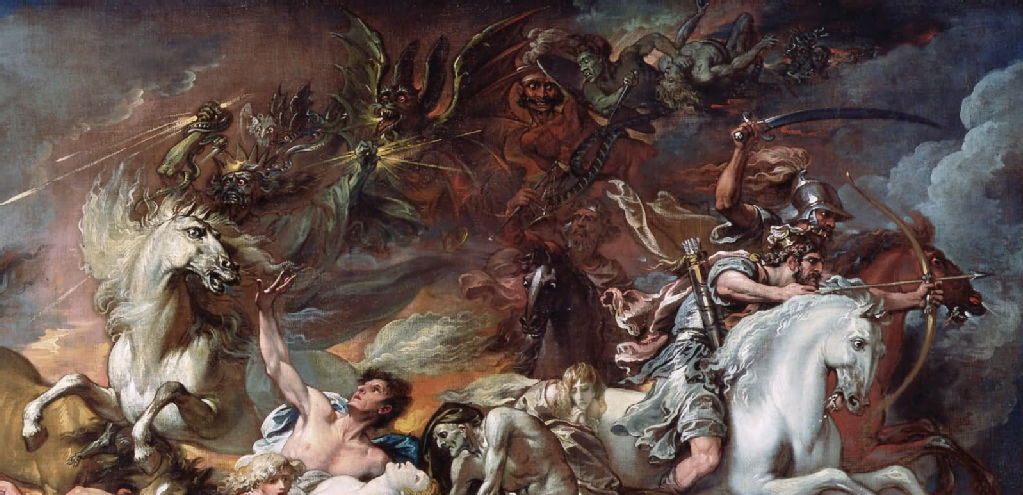Keats & Hemans
Death on a Pale Horse; by the American-born painter Benjamin West (1738-1820)

‘I am certain of nothing but of the holiness of the Heart’s affections and the truth of Imagination – What the imagination seizes as Beauty must be truth – whether it existed before or not – for I have the same Idea of all our Passions as of Love they are all in their sublime, creative of essential Beauty . . . The Imagination may be compared to Adam’s dream – he awoke and found it truth’ - Keats, letter to Benjamin Bailey, November 22, 1817
‘I spent Friday evening with Wells, and went next morning to see Death on the Pale Horse. It is a wonderful picture, when West’s age is considered; But there is nothing to be intense upon; no woman one feels mad to kiss, no face swelling into reality — The excellence of every art is its intensity, capable of making all disagreeables evaporate, from their being in close relationship with Beauty and Truth. . . . I know such like acquaintance will never do for me and yet I am going to Reynolds on Wednesday. Brown and Dilke walked with me and back from the Christmas pantomime. I had not a dispute but a disquisition, with Dilke on various subjects; several things dove-tailed in my mind, and at once it struck me what quality went to form a Man of Achievement, especially in Literature, and which Shakespeare possessed so enormously — I mean Negative Capability, that is, when a man is capable of being in uncertainties, mysteries, doubts, without any irritable reaching after fact and reason — Coleridge, for instance, would let go by a fine isolated verisimilitude caught from the Penetralium of mystery, from being incapable of remaining content with half-knowledge. This pursued through volumes would perhaps take us no further than this, that with a great poet the sense of Beauty overcomes every other consideration, or rather obliterates all consideration. - John Keats, letter, 21 Dec. 1817
‘Well--I compare human life to a large Mansion of Many Apartments, two of which I can only describe, doors of the rest being as yet shut upon me--The first we step into we call the infant or thoughtless Chamber, in which we remain as long as we do not think--We remain there a long while, and notwithstanding the doors of the second Chamber remain wide open, showing a bright appearance, we care not to hasten to it; but are at length imperceptibly impelled by the awakening the thinking principle--within us-we no sooner get into the second Chamber, which I shall call the Chamber of Maiden-Thought, than we become intoxicated with the light and the atmosphere, we see nothing but pleasant wonders, and think of delaying there for ever in delight: However among effects this breathing is father of is that tremendous one of sharpening one's vision into the heart and nature of Man--of convincing ones nerves that the World is full of Misery and Heartbreak, Pain, Sickness and oppression--whereby This Chamber of Maiden Thought becomes gradually darken'd and at the same time on all sides of it many doors are set open--but all dark--all leading to dark passages--We see not the ballance of good and evil. We are in a Mist--We are now in that state--We feel the 'burden of the Mystery'. . .’ - John Keats, letter, May 3, 1818
We had been listening, during one of these evening rides, to various sounds and notes of birds, which broke upon the stillness, and at last I said—"Perhaps there may be a deeper and richer music pervading all Nature, than we are permitted, in this state, to hear." He answered by reciting those glorious lines of Milton's, "Millions of spiritual creatures walk the earth, / Unseen, both when we wake and when we sleep, &c." and this in tones that seemed rising from such depths of veneration! - Felicia Hemans, letter, 1830
